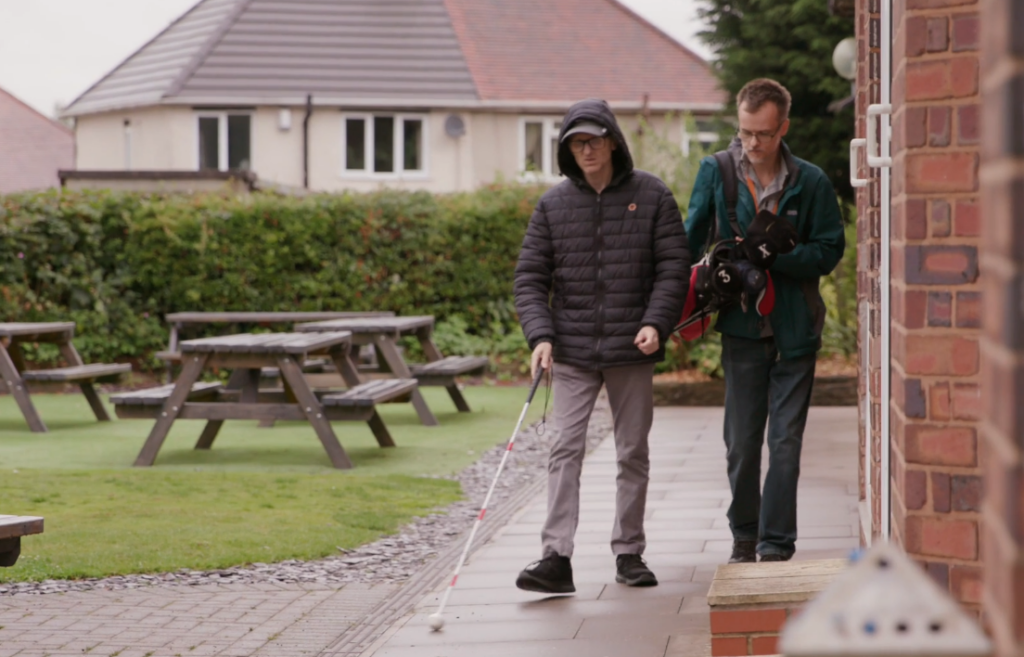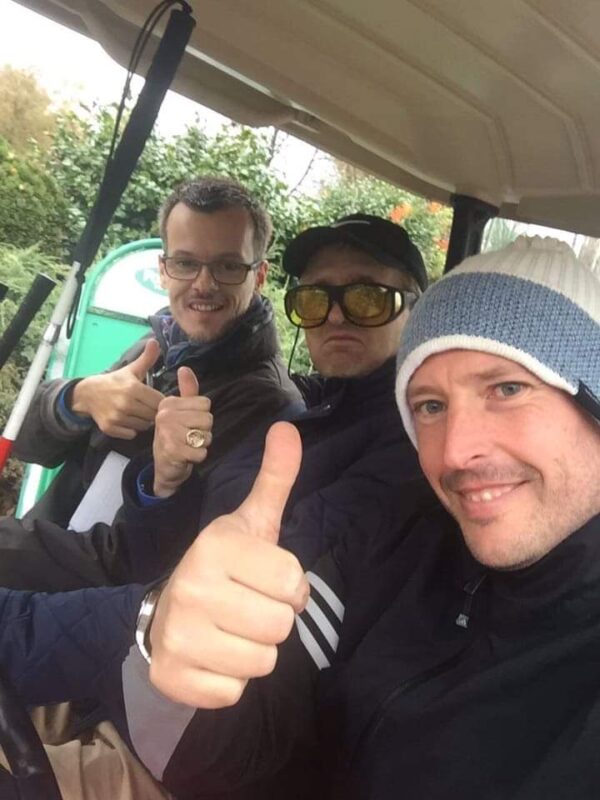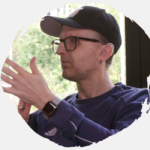From language to golf, becoming deafblind hasn’t stopped me learning
Simon knows what it’s like to feel excluded and unable to access the world around him. In his forties, he suddenly had to adjust to life as a deafblind man, a transition that came with many challenges. But with support from Sense, he’s broken every barrier.
Descriptive transcript of the video
Simon is a slim middle-age man wearing glasses, a cap and a hooded raincoat. He’s standing on a golf course looking down at his club, which he’s preparing to swing.
Sitting indoors, Simon, who is wearing a cap and a blue sweater, uses British Sign Language to introduce himself. His glasses and hearing aid indicate that he is deafblind. Text appears on screen. It reads, ‘Simon’.
Simon: My name’s Simon. I’ve got Usher syndrome and I’m Deaf and a sign language user.
Simon and another man, Martyn, walk with their backs to the camera down a woodland path. They’re both wearing rain jackets and Simon is using a long white cane to guide his way.
When I started losing my sight, communication with my family started to break down.
It became hard for them to support me.
Simon and Martyn stand outside with a third man, Craig. Simon is feeling Martyn’s hands as he signs; Martyn is pointing Simon towards the golf balls in Craig’s outstretched hands. Martyn carries Simon’s golf clubs as he walks ahead with his cane out before him.
Martyn from Sense helps me ever such a lot. He helps me to learn different things and do activities like golf. Martyn gives me tactile sign language because my Usher syndrome means I can’t see clearly anymore.
Sitting indoors, Martyn, who is wearing glasses and a short-sleeved shirt, sits facing Simon. Simon’s hands are on Martyn’s so he can feel the signs being made. Simon gives Martyn a thumbs up to show he understands.
Without Sense, my life would be really quiet.
Simon, Martyn and Craig walk across the edge of a golf green.
Indoors, Martyn faces the camera and uses British Sign Language to tell Simon’s story. Text appears on screen. It reads, ‘Martyn, Sense communicator guide’.
Martyn: When he became blind, Simon had to learn a new language at the age of 41. Before he had support from Sense, Simon was so isolated and lonely, he was really dejected.
Craig and Simon head out to play golf. Simon gives Craig a thumbs up and then gently puts a golf ball into a hole.
Since working with Simon, I’ve really seen him flourish and achieve a lot. Simon wanted to learn golf, so I found a golf course in Wolverhampton where the staff had worked with Deaf people.
Simon, Martyn and Craig stand walk along the rainy golf course, pulling a golf club caddy.
Simon: I was really nervous initially when I started to play golf, Martyn helped to calm those nerves.
Both Martyn and Craig communicate with Simon using tactile sign language. Craig lifts Simon’s golf club, showing him how to position it when he hits the ball.
Craig started to teach me golf through touch. He would tell me if I just needed to putt gently or give it a hard swing – he’d communicate all those things. It’s really helped with my confidence, with my communication with people.
Simon putts the ball towards a far away hole, while Craig stands watching. Craig pats Simon’s shoulder, they smile at each other and bump fists.
Martyn: Seeing Simon become so independent and break down all of those barriers…It really showed me the value of the support Sense provides.
He’s a great role model for people who are deafblind. If Simon can do it, you know, other people can do it.
Without Sense, my life would be really quiet. I grew up using sign language because I’m Deaf, then, about seven years ago my eyesight also started to deteriorate. This is how Usher syndrome affects people, senses can change over time and leave people deafblind.
My daily routine – even using my language, which is very visual – became a struggle. My independence was reduced, and my world shrank.
With all these new challenges, my family recognised that I needed some extra support. I already had a connection with Sense through Martyn, who was part of my local Deaf club. I knew he worked at Sense, but this was the first time I’d approached him for advice.
Martyn was able to set me up with Sense and become one of my communicator guides. He was there to support me to adapt to life as a deafblind man, and to access all the hobbies I’d had before. There were a lot of challenges to face, but it was nice knowing I wasn’t alone.

Learning a new language at 41
I live with my parents, my mum and dad, and they’ve always looked after me a lot. But as they got older and I started losing my eyesight, communication started to break down. It became more difficult to sign to each other, as I wasn’t able to see clearly, and hard for them to support me.
I knew that if I wanted to keep up with my hobbies, like going to the gym, I’d need to learn to use a cane. And if I wanted to connect with people around me, I’d have to learn how to understand hand-on-hand sign language. The idea of learning a new language at the age of 41 was daunting. I’m really glad Martyn was there to help.
Hand-on-hand signing is where you feel the signs being made by someone’s hands, rather than seeing them. This is how I engage with the world around me now. Martyn translates things into tactile signs so that I understand what’s happening and can sign back (using regular British Sign Language).
At first, I wasn’t confident communicating this way. But over time, Martyn has calmed those nerves. I feel able to go out and try new activities and meet new people. I joined a drama group and started a job in a Deaf café. I don’t feel so anxious or isolated now.
Since he started coming to Sense, I’ve really seen Simon flourish and achieve a lot. He’s a great role model for deafblind people. If Simon can do it, you know, other people can do it.
Martyn, who supports Simon

Teaching through touch
The more confident I felt doing things in the community, the more I wanted to try out. I’ve always wanted to learn how to play golf. When I told Martyn about this, he found a golf course in Wolverhampton where the staff had worked with Deaf people. I met Craig, the coach, and started some lessons.
At first, Craig would write things down and Martyn would sign them to me. But overtime we built our own way of communicating. Now he teaches me through touch. He can tell me if I need to putt gently or give a hard swing and let me know if I’ve got the ball in the hole.
Having something I can do independently – and with someone who doesn’t sign – has been a big confidence boost. I feel more comfortable communicating and connecting with other people.
I really like being able to take part in activities like this, it means a lot to me.
Our impact
Sense works to ensure that no one is left out at any stage of life. Our support reflects people’s individual aspirations and evolving needs; we want to see everyone enjoy the same opportunities to learn, explore new things and live independently.
Find out more about the work we do and the difference your support makes:

